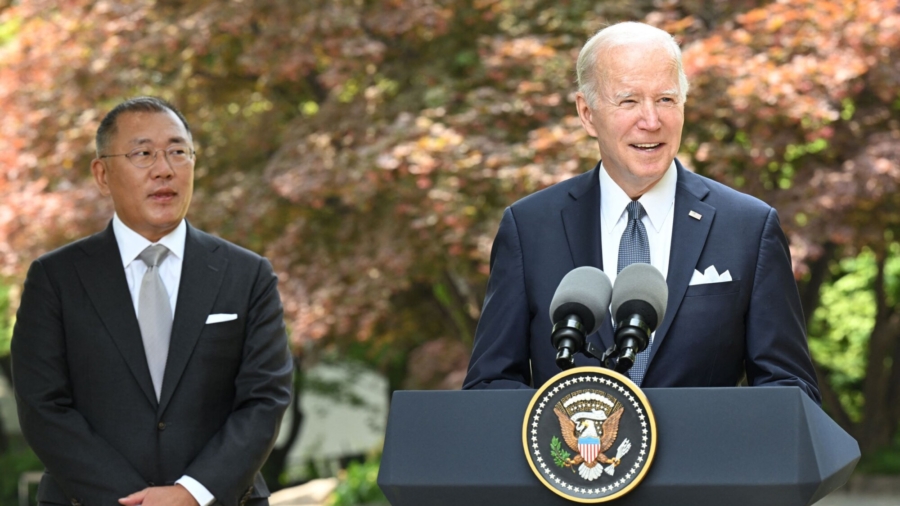President Joe Biden wrapped up his South Korea visit by highlighting Hyundai Motor’s pledge to invest at least $10 billion in electric vehicles and related technologies in the United States.
The three-day Biden-Yoon summit tended to various business and security interests, from supply chains to North Korea.
On Sunday, May 22, the last day of Biden’s visit, South Korean auto giant Hyundai Motor reaffirmed its $5.5 billion investment for an electric vehicle and battery factory in Georgia, with another $5 billion investment in artificial intelligence for autonomous vehicles and other technologies, according to a Voice of America report.
Biden toured Samsung’s chip complex in Pyeongtaek on his first day in Seoul, accompanied by the new South Korean president, Yoon Suk-yeol, and guided by Samsung Electronics Vice Chairman Lee Jae-yong. The complex houses some of the world’s largest chip production lines, accounting for about 15 percent of global memory chip production.

During the tour, the two leaders pledged to strengthen semiconductor alliances among the world’s largest chip-making countries to ease the global shortages.
In the first summit held between Biden and Yoon on May 21, the two leaders reportedly discussed a range of security and economic challenges facing the allies and the region, including North Korea’s nuclear program and supply chain risks.
In a joint statement, the two leaders pledged to reactivate the high-level security dialogue mechanism, the Extended Deterrence Strategy and Consultation Group (EDSCG), “at the earliest date” and reinforce the combined defense posture.
EDSCG was established in 2016 by the Trump and Moon Jae-in administrations to ramp up discussions over various measures on extended deterrence against North Korea. But denuclearization talks with the North have not been held since 2018.
Biden reaffirmed the United States extended deterrence commitment to South Korea “using the full range of U.S. defense capabilities, including nuclear, conventional, and missile defense capabilities,” amid growing nuclear and missile threats from North Korea.
“Both leaders agree to initiate discussions to expand the scope and scale of combined military exercises and training on and around the Korean Peninsula,” the statement reads.
In addition, Biden and Yoon seek to deepen the countries’ strategic economic and technology partnership as well as energy security. The two leaders agree to “protect and promote critical and emerging technologies, including leading-edge semiconductors, eco-friendly EV batteries, Artificial Intelligence, quantum technology, biotechnology, biomanufacturing, and autonomous robotics.”
As part of the economic partnership, South Korea formally announced participation in the U.S.-led Indo-Pacific Economic Framework (IPEF), a framework outlining the United States’ key priorities to align with allies and partners to compete more effectively with communist China in the race to led global technology development and norms.
On May 21, Hyundai Motor announced the signing of the agreement with the state of Georgia, investing approximately $5.54 billion in the new EV plant and battery production facilities. Groundbreaking for the new plant will occur in early 2023, with commercial production expected to begin in the first half of 2025 and an estimated annual capacity of 300,000 vehicles.
South Korean Conglomerates to Cut Reliance on China
Many South Korean conglomerates have since started diversifying production bases to cut reliance on China following the Chinese boycott.
The combined sales of Hyundai Motor Company and Kia Corp. in China peaked at 1.79 million cars in 2016, following South Korea’s deployment of THAAD (Terminal High Altitude Area Defense). The move has since triggered a strong boycott of Korean products in China, resulting in declining sales, with the sales number dropping below 500,000 last year.
THAAD is a U.S.-designed and manufactured anti-missile system installed in South Korea between 2016 and 2017 to defend against North Korea’s missile build-up. However, Beijing has insisted that the deployment of THAAD affects China’s security and has since adopted a series of countermeasures against South Korea.

Last October, South Korean tech conglomerate SK Group announced its pledge to invest $52 billion in the United States by 2030, following the moves of many South Korean tech giants shifting supply chain investment to the United States.
In late September, SK Innovation, a subsidiary of SK Group, which operates two battery plants in Georgia, said that it would spend approximately $4.45 billion through its joint venture with Ford to expand battery production in the United States. The newly established joint venture, named BlueOvalSK, is one of the largest battery plant investments in the United States.

Hours before last year’s U.S.-South Korea summit, four major South Korean companies, including Samsung Electronics, SK Group, LG Energy Solution, and Hyundai Motor Company, announced plans to invest $39.4 billion in the United States during a business roundtable.
The investment plans involve semiconductors and electric vehicle batteries—two core areas that the U.S. sees as intrinsic to rebuilding supply chains, countering China’s dominance, and addressing manufacturing vulnerabilities laid bare during the CCP (Chinese Communist Party) virus pandemic.
From The Epoch Times

